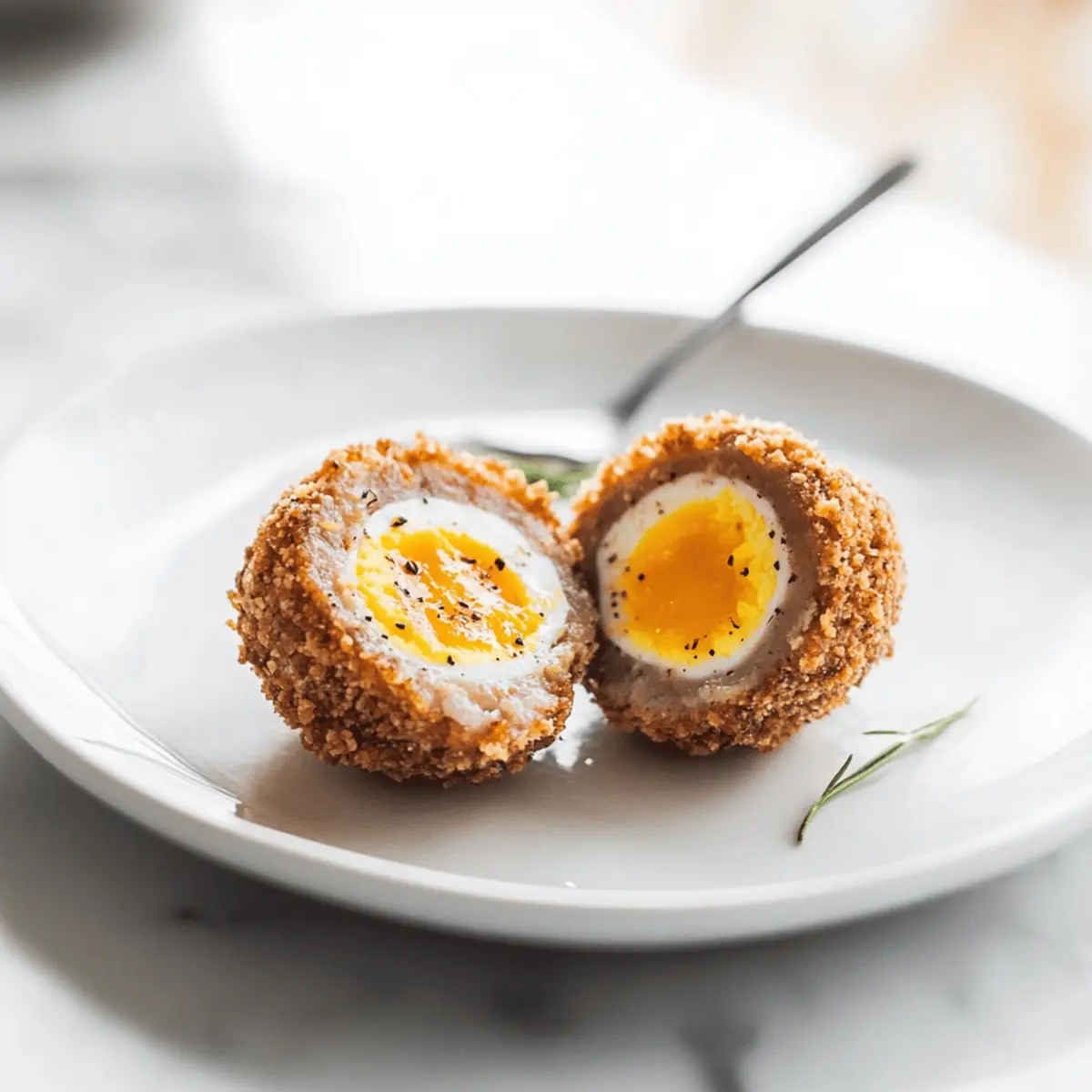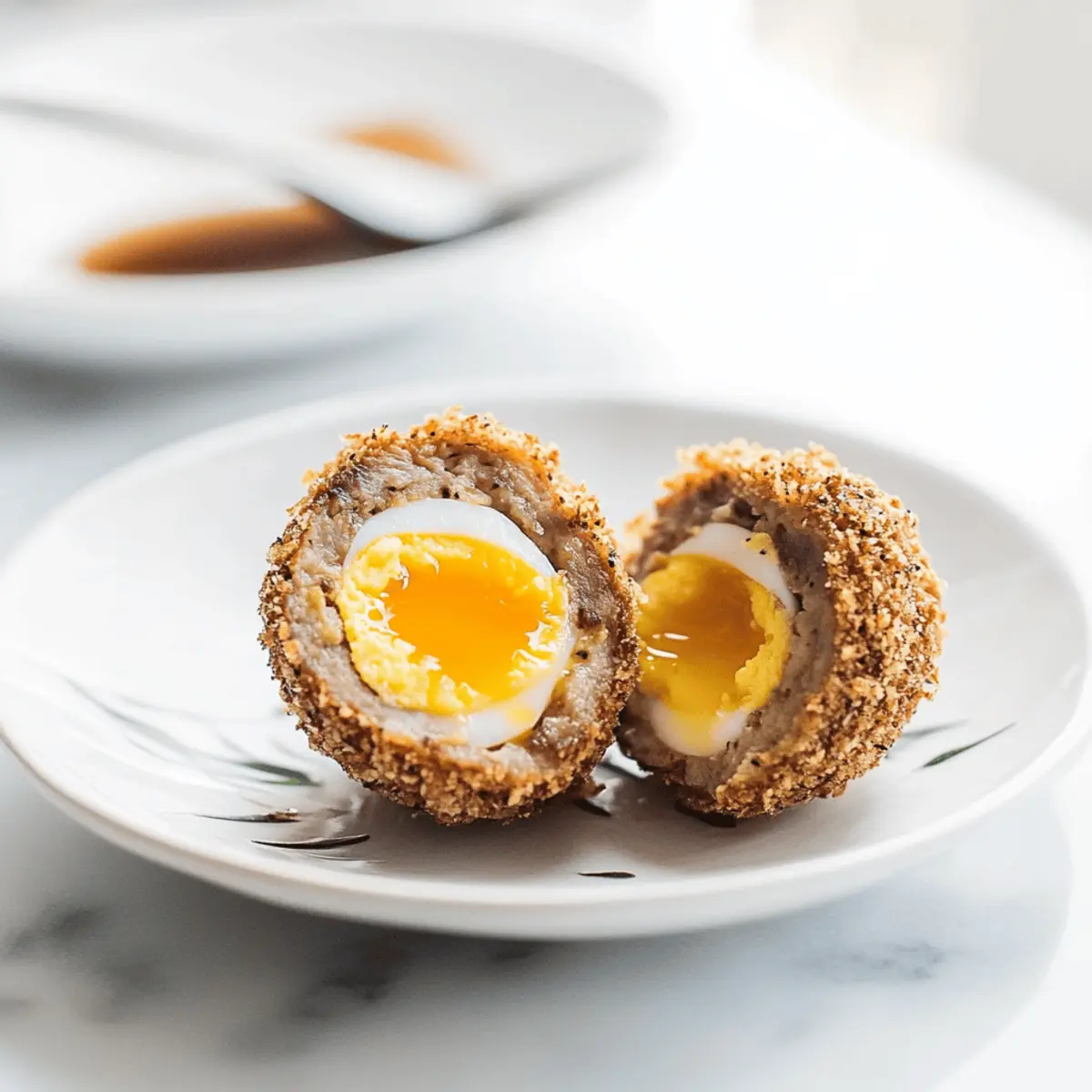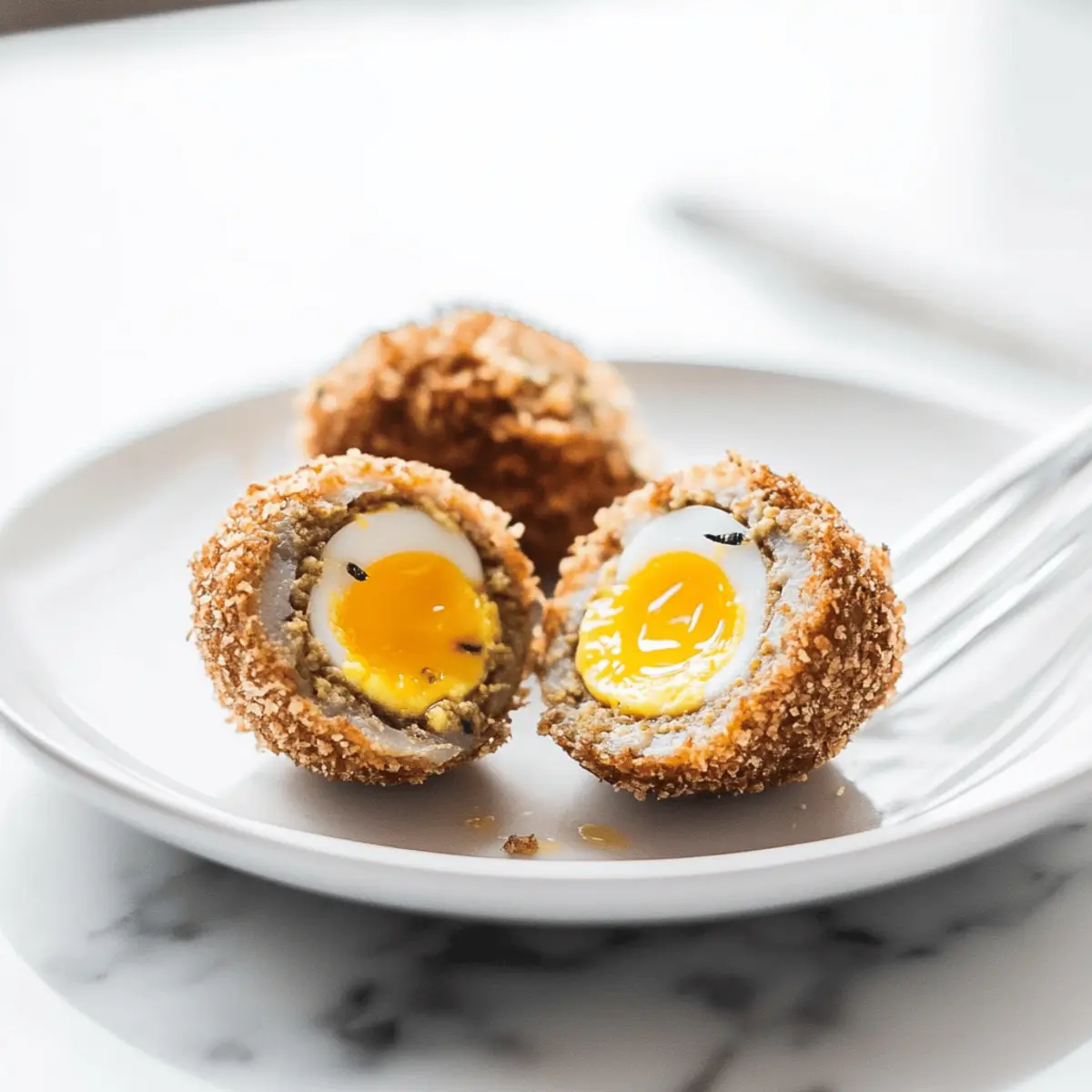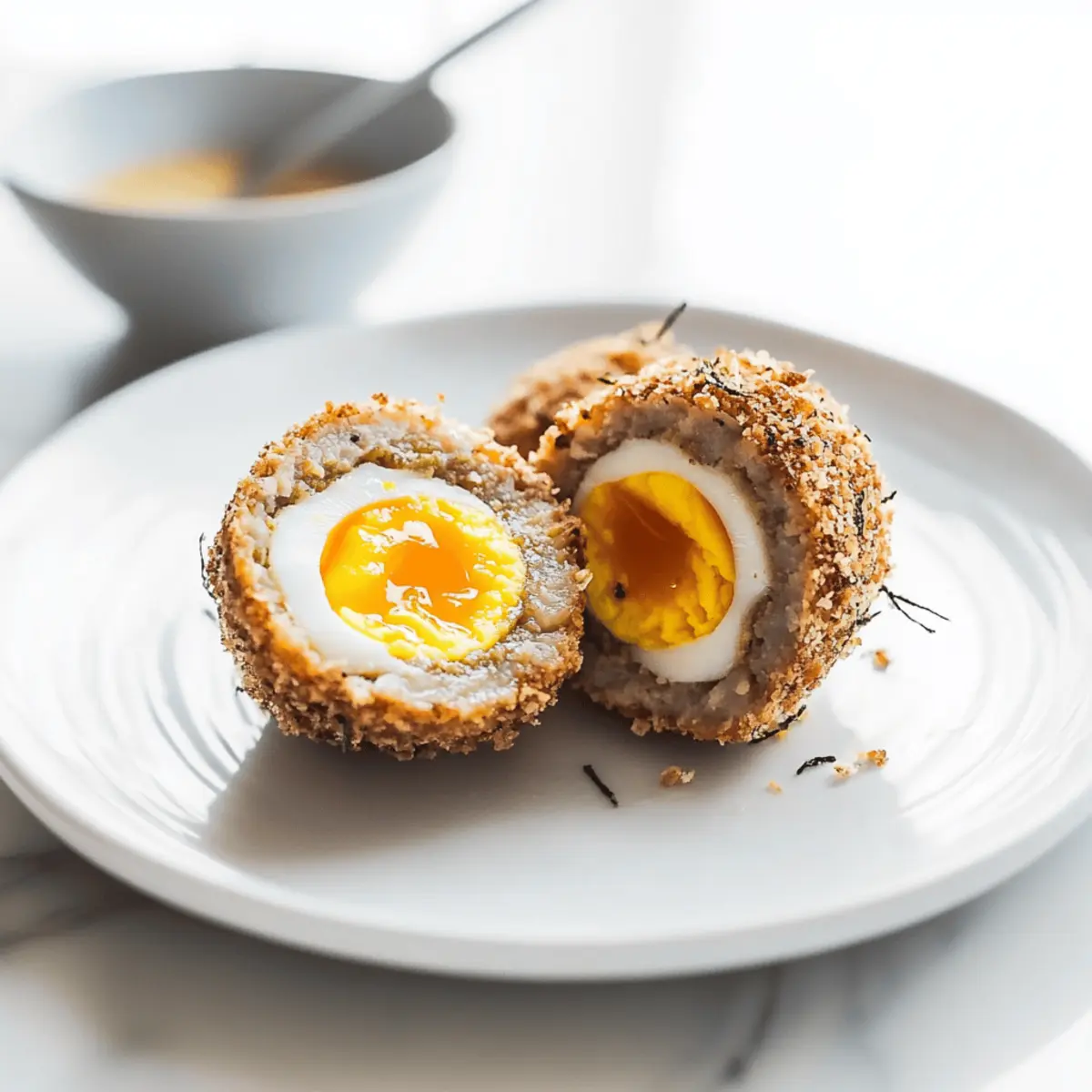As the sizzle of oil fills the kitchen, I can’t help but think how deliciously satisfying homemade food can be. Today, I’m excited to whisk you away on a culinary journey with my take on the Japanese Scotch Egg—an innovative fusion that marries the comforting flavors of a traditional British dish with a unique Japanese twist. Imagine a luscious, soy sauce marinated egg nestled in a seasoned pork dumpling filling, all enrobed in a crispy panko crust. This recipe isn’t just fun to make; it’s also perfect for impressing guests or simply indulging yourself after a long day. Plus, the tangy curry-mayo dipping sauce is the secret ingredient that elevates this dish to greatness. Ready to take your taste buds on an adventure? Let’s dive into this delectable recipe!

Why is this recipe a must-try?
Flavor Fusion: Experience an incredible amalgamation of British and Japanese cuisines, marrying savory pork with a soy sauce marinated egg.
Crispy Delight: Every bite delivers a satisfying crunch from the panko crust, creating a perfect contrast to the tender filling.
Effortless Elegance: Impress your guests without breaking a sweat—this dish is simple yet sophisticated.
Versatile Options: Choose from various fillings and dipping sauces to customize the recipe based on your preferences. Try it with the flavorful Inspired Cabbage Egg for another exciting twist!
Time-Saving Treat: Ideal for meal prep; whip these up in advance and simply fry when you’re ready to feast!
Crowd-Pleaser: Perfect as an appetizer for gatherings, this dish brings smiles and satisfied palates to any table.
Japanese Scotch Egg Ingredients
• Ready to create your delightful Japanese Scotch Egg masterpiece? Here’s everything you need!
For the Egg
- Eggs – Essential for this recipe, soft-boiled eggs provide a deliciously runny yolk.
For the Pork Filling
- Ground Pork – The star protein that brings richness; feel free to substitute with ground chicken or turkey for a leaner option.
For the Coating
- Panko Breadcrumbs – These are perfect for achieving a crispy exterior; if you can’t find panko, standard breadcrumbs can work but with a different texture.
For the Marinade
- Soy Sauce – Adds umami and depth to the marinated eggs; swap for tamari if you’re looking for a gluten-free alternative.
For the Dipping Sauce
- Curry Powder – A key ingredient in the dipping sauce providing warmth—adjust the amount based on your spice preference.
- Mayonnaise – Acts as the creamy base for your sauce; Greek yogurt can be used for a lighter version instead.
Step‑by‑Step Instructions for Japanese Scotch Egg
Step 1: Marinate Eggs
Begin by soft-boiling or hard-boiling your eggs for about 6-8 minutes for a runny yolk, or 10-12 minutes for a firmer center. Once boiled, immediately place the eggs in an ice bath for 5 minutes to stop the cooking process. Carefully peel the eggs, and marinate them in soy sauce for at least 30 minutes to infuse the rich umami flavor.
Step 2: Prepare Pork Filling
In a mixing bowl, combine ground pork with a pinch of salt, pepper, and any desired spices like garlic powder or ginger. Blend the mixture well for about 2-3 minutes until it’s sticky and slightly tacky. This adds a savory depth to your Japanese Scotch Eggs. Set the mixture aside to absorb the flavors while you prepare for the assembly.
Step 3: Assemble Scotch Eggs
Once the eggs have marinated, take a generous handful of the pork mixture and flatten it in the palm of your hand. Place a marinated egg in the center, gently folding the pork around the egg until evenly covered. Ensure there are no gaps and the pork clings well to create a uniform shape, forming the Japanese Scotch Egg that is tender yet flavorful.
Step 4: Coat with Panko
Prepare a shallow dish with panko breadcrumbs. Carefully roll each wrapped egg in the breadcrumbs, pressing lightly to ensure an even coating. Make sure your Japanese Scotch Egg is fully covered for a crispy finish. Place the coated eggs on a plate and let them rest for about 10 minutes; this helps the coating adhere better during frying.
Step 5: Fry
In a deep pan or a fryer, heat oil to around 350°F (175°C). Gently lower the coated eggs into the hot oil, frying in batches for about 4-5 minutes until they turn golden brown and crispy. Use a slotted spoon to turn them occasionally, ensuring an even cook. Once perfectly golden, remove the Japanese Scotch Eggs and let them drain on paper towels.
Step 6: Make Dipping Sauce
While the eggs are cooling slightly, whisk together mayonnaise and curry powder in a small bowl until smooth. Taste and adjust seasoning if necessary, adding more curry for a kick or a dash of salt to enhance flavors. This tangy curry-mayo sauce serves as a delightful accompaniment, marrying beautifully with the richness of the Japanese Scotch Egg.
Step 7: Serve
Slice each Japanese Scotch Egg in half, revealing the luscious, marinated egg center. Arrange the halves on a serving platter, accompanied by the curry-mayo dipping sauce. This presentation not only looks inviting but allows guests to savor each bite of the crunchy outer layer, savory pork filling, and creamy egg yolk. Enjoy this unique fusion experience!

Japanese Scotch Egg Variations
Feel free to let your creativity shine by customizing this dish to fit your taste and dietary preferences!
- Dairy-Free: Substitute Greek yogurt in the dipping sauce with a dairy-free alternative, like avocado or hummus for creaminess without dairy.
- Vegetarian: Try using mashed chickpeas or lentils mixed with spices as a filling for a delicious vegetarian twist.
- Spicy Kick: Add a pinch of chili flakes to the pork filling or your dipping sauce for an extra burst of heat.
- Herbed Twist: Incorporate finely chopped herbs like cilantro or green onion into the pork filling for an aromatic lift.
- Miso Marinade: Swap soy sauce for a miso-based marinade for the eggs to introduce a new depth of flavor that’s delightfully savory.
- Nutty Crunch: Toss some crushed nuts into the panko mixture for an added crunch that will elevate your dish!
- Creative Dips: Enjoy these Scotch Eggs with various dipping sauces like sweet chili sauce or a zesty tzatziki for a different flavor profile.
- Crispy Alternatives: Instead of panko, use crushed potato chips for a fun, crunchy coating that adds unexpected flavor!
While you’re experimenting, you might enjoy trying these with the refreshing Crunchy Cucumber Egg or to add some richness, make a quick Savory Cheese Egg. Happy cooking!
How to Store and Freeze Japanese Scotch Egg
Fridge: Store leftover Japanese Scotch Eggs in an airtight container for up to 3 days. Reheat in an air fryer or oven to restore their crispy texture.
Freezer: For longer storage, freeze uncoated Scotch Eggs. Wrap them tightly in plastic wrap and place in a freezer-safe bag for up to 3 months.
Reheating: When ready to enjoy, thaw in the fridge overnight, then reheat in an air fryer until warmed through and crispy.
Make-Ahead Tip: You can prepare the filling and marinate the eggs a day ahead, keeping the process smoother when you’re ready to fry.
What to Serve with Japanese Scotch Egg
Elevate your dining experience with delightful accompaniments that complement the rich flavors of this fusion dish.
- Crispy Green Salad: Refreshing greens provide a crunchy contrast, lightening the richness of the Scotch egg. Toss with a tangy vinaigrette for a perfect match.
- Steamed Edamame: These tender soybeans add a subtle, savory note that enhances the overall flavor profile, while also bringing a fun, interactive element to your meal.
- Pickled Veggies: A small side of tangy pickles cuts through the richness and adds a burst of acidity that piques your palate for the next bite.
- Coconut Rice: This subtly sweet, fragrant rice offers a soft texture that balances the crunchiness of the Scotch egg, creating a comforting plate.
- Sake or Light Lager: Pairing your meal with a chilled glass of sake or a light lager enhances the umami without overwhelming the dish.
- Miso Soup: A warm bowl of miso soup wraps the meal in an authentic Asian flair, introducing comforting flavors that harmonize beautifully with the Scotch egg.
- Asian Slaw: Crunchy, colorful cabbage slaw dressed in sesame vinaigrette adds zest to your meal, combining freshness with delightful crunch.
- Chocolate Mochi: Finish off with these chewy treats for dessert; they deliver a sweet, satisfying end to your meal while echoing the Japanese theme.
Expert Tips for Japanese Scotch Egg
- Egg Precision: Make sure your eggs are at room temperature to avoid cracking during boiling. This allows for a smooth soft-boil and a perfect runny yolk.
- Meat Texture: When preparing your ground pork filling, ensure it’s well-combined to achieve a uniform texture; this improves flavor and helps the pork hold together around the egg.
- Coating Mastery: Press the panko breadcrumbs firmly onto the coated egg to ensure a crispy crunch when frying. This helps avoid any parts peeling off during cooking.
- Oil Temperature: Maintain a steady oil temperature of 350°F for the best frying results. Too hot, and your Scotch eggs may burn; too cool, and they can become greasy.
- Serving Fresh: For the best flavor and texture, serve your Japanese Scotch Eggs immediately after frying. However, they can be made ahead—just reheat them in an air fryer for that crispy finish!
- Experiment Flavors: Feel free to play with spice levels in your curry-mayo sauce. A little more curry powder can add an exciting kick that enhances the overall dish.
Make Ahead Options
These Japanese Scotch Eggs are perfect for busy home cooks looking to save time! You can marinate the eggs up to 24 hours in advance; this allows the flavors to deepen, enhancing the umami richness. Additionally, you can prepare the pork filling and form the Scotch Eggs, then refrigerate them for up to 3 days prior to frying. To maintain the crispy texture, avoid coating them in panko until just before frying. When you’re ready to serve, simply coat the prepped eggs in panko and deep-fry them until golden brown. This method offers you the convenience of a delicious homemade appetizer with minimal last-minute effort, ensuring it’s just as delightful for you as it is for any guests!

Japanese Scotch Egg Recipe FAQs
What kind of eggs should I use for Japanese Scotch Egg?
I recommend using large, fresh eggs for the best results. Soft-boiled eggs deliver a luscious, runny yolk that contrasts beautifully with the savory pork filling. However, if you prefer a firmer texture, hard-boiled eggs work just as well.
How do I store leftover Japanese Scotch Eggs?
Store any leftover Scotch Eggs in an airtight container in the refrigerator for up to 3 days. When reheating, use an air fryer or conventional oven at 350°F to maintain the crispy texture for the best experience.
Can I freeze Japanese Scotch Eggs?
Absolutely! To freeze, prepare your Scotch Eggs but skip the frying step. Once formed, wrap each egg tightly in plastic wrap and place them in a freezer-safe bag. They can be stored for up to 3 months. When ready to enjoy, thaw in the fridge overnight and then fry from frozen at 350°F for about 6-8 minutes.
Why is my pork filling falling off the egg?
This can happen if the pork mixture isn’t compact enough. Ensure that you mix the ground pork with seasonings until it’s sticky and well-combined, and make sure to fully encase the egg when wrapping it. Also, pressing the panko breadcrumbs firmly onto the coated egg can help keep it intact during frying.
Is this recipe suitable for gluten-free diets?
Yes! You can make a gluten-free version of the Japanese Scotch Egg by replacing panko breadcrumbs with gluten-free breadcrumbs or crushed cornflakes. Additionally, using tamari instead of soy sauce for marinating the eggs will keep this dish gluten-free.
Can pets eat Japanese Scotch Eggs?
It’s best to avoid giving your pets any part of the Japanese Scotch Egg, especially due to the soy sauce used in marinating and spices in the pork filling. Always consult your veterinarian if you’re unsure about sharing human food with your furry friends!

Savory Japanese Scotch Egg with Curry-Mayo Sauce Magic
Ingredients
Equipment
Method
- Marinate Eggs: Soft-boil eggs for 6-8 minutes. Place in an ice bath for 5 minutes, peel, and marinate in soy sauce for 30 minutes.
- Prepare Pork Filling: Combine ground pork with salt, pepper, and spices. Mix until sticky, about 2-3 minutes.
- Assemble Scotch Eggs: Flatten a handful of pork mixture, place a marinated egg in the center, and fold the pork around the egg.
- Coat with Panko: Roll each egg in panko breadcrumbs, ensuring even coverage, and let rest for 10 minutes.
- Fry: Heat oil to 350°F. Fry coated eggs for 4-5 minutes until golden brown, using a slotted spoon to turn them.
- Make Dipping Sauce: Whisk together mayonnaise and curry powder until smooth; adjust seasoning if necessary.
- Serve: Slice eggs in half, arrange on a platter with dipping sauce, and enjoy!

